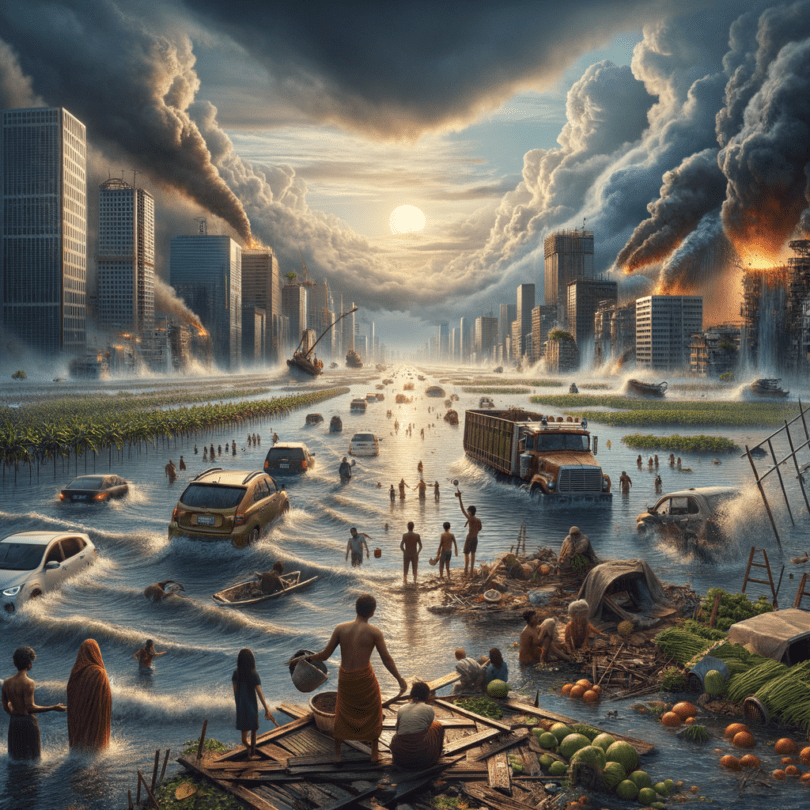I gotta say, flooding—it feels like Mother Nature’s way of giving us a really tough lesson. I used to think of water as this gentle, soothing thing. You know, like those calming ocean waves or the relaxing sound of rain on a lazy afternoon. But, man, when it comes to floods, that picture-perfect image just shatters. It turns water into a wrecking ball, smashing right through the lives of people and communities.
I remember those news stories, each one more heart-wrenching than the last. Homes swamped, pets struggling on top of roofs, whole towns cut off—it’s tough. And it’s not just in far-off places—it happens everywhere. It’s wild how places we think of as advanced can still be so vulnerable. It’s like, here I am in the 21st century, thinking we’d have this all figured out, but then a flood comes and it’s like nature giving us a big, fat reality check.
The Unseen Enemy: Different Faces of Flooding
Funny, isn’t it, how water, something so abundant on our planet, can turn into such a nightmare? Floods come in all shapes and sizes. Sometimes it’s the heavy rain that won’t quit. Other times, ocean water just decides to crash the party in coastal areas. And don’t get me started on when all that winter snow melts too fast, racing down to drown everything in its path.
Take Hurricane Harvey back in 2017, for example—Texas got pummeled with over 60 inches of rain! Watching it on TV, it was like an endless fire hose had been turned loose. The destruction was beyond words—neighborhoods underwater, cars floating around like sad, metal boats. It hit home how relentless nature can be.
But it’s not just those big scary storms. Sometimes the disasters are because of things we’ve built, like a dam giving way or levees overpowered by sheer water force. Those get to me because they scream human error or oversight. And flash floods, sigh, they’re like life’s nasty surprises—hitting you out of nowhere, like a dodgeball you didn’t even see coming.
The Stories Behind the Numbers
The stories though, those personal tales—they really get me. Every headline has faces and names, people whose lives are flipped upside down. It’s hard not to feel a pang in your heart for them. Makes me think about my own home and what it means to me. What would I do if it all vanished just like that?
I read about a man during the 2021 floods in Belgium and Germany—I can still picture his tears as he wished for just five extra minutes to grab his wife’s cherished necklace. Not because of what it was, but what it meant. It’s the little things, the essence of what makes a house feel like home, gone in an instant. And that feeling of helplessness hits—it must be horrible, watching everything you’ve built turn to mush.
Why are we always playing catch-up? When we know these floods aren’t a matter of ‘if’ but ‘when’, why are we not better prepared?
Doing More: Preparation, Prediction, and Prevention
Picture a world where we face flood warnings with confidence and readiness instead of panic. Ugh, if only! Yet, we humans have this annoying habit of dealing with problems only when they’re right on our doorstep. It’s like a universal human quirk. We’re in a time where predicting floods isn’t just science fiction, we have the tech! But there’s always this weird disbelief until the water is at our ankles.
I mean, shouldn’t we be using what we know? Things like urban sprawl, chopping down trees, and climate change, of course. It’s a long list, and honestly, it can feel overwhelming. Can we really change all that just by planning ahead?
I love the thought of investing in infrastructure. Not just big barriers, but smarter policy moves, designing towns with floods in mind. And educating people? That’s gotta be key. Preparedness should be as basic as knowing how to tie your shoes.
Nature, Our Greatest Teacher
Sometimes I think we forget that nature has its own lessons. It’s funny but true—when we let nature run its course, it often knows best. Restoring wetlands and letting rivers be rivers could be our ace in the hole. It feels old-fashioned, but there’s wisdom in that simplicity. Instead of fighting against nature, maybe we should join forces with it.
Wetlands, acting like giant sponges, soaking up water. Trees drinking up rainwater like parched travelers. We’ve pushed into nature’s territory so much, it’s only fair we back off a bit. It’ll be good for the planet—and definitely good for us.
Building the Future: A Collective Responsibility
At the end of the day, handling floods is a job for all of us—governments, environmentalists, regular folk. We’re all links in this big chain, and floods can snap those links in a heartbeat.
These disasters are sharp reminders of how connected we all are. As gut-wrenching as it is to see the devastation, it’s heartening to witness the aftermath—the kindness, the community spirit. Neighbors offering lifelines, strangers becoming family. It’s proof that no flood can erase our humanity.
With unpredictable climates and wild weather becoming the norm, we need to gear up and fight these watery foes with everything we’ve got. Let’s aim for a story in the history books that tells of our grit—not because we gave up, but because we innovated, stood united, and let our human spirit shine bright.

